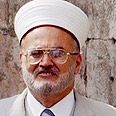
The post of the grand mufti was never reduced to merely delving into religious issues. In the 1940s the grand mufti of Jerusalem, Hajj Amin Al-Husseini, was the most powerful and influential leader of the Palestinians. Politics and religion were completely mixed back then, and Al-Husseini was considered a political leader as much as he was a religious one.
To view video of interview click here >
Five decades later, things have changed. In 1993 the Palestinian Authority was established, and the grand mufti was appointed by the Palestinians' political leader, chairman Yassir Arafat. Arafat appointed Sheikh Ikrima Sabri, a charismatic cleric and a close associate.
One thing was obvious from the start: Sabri did not believe Israel could be trusted as a partner for peace. He also expressed his belief that Israel had no claim to the Temple Mount and that Al-Aq'sa Mosque was endangered by Israeli aggression.
During Arafat's time, such statements could be let slide. But when Mahmoud Abbas rose to power after Arafat's demise in 2004, he found them hard to accept. Abbas aspired to forge ahead with the peace process with Israel, and the anti-Israel "political mufti" became a thorn in his side.
'A simple man of humble means'
In July 2006 Abbas fired the charismatic Sabri. The official word from the chairman's office was that Sabri had reached retirement age.
The truth, however, was far from it. The more Sabri gained popularity in the Palestinian street, the more he expressed his views on highly contentious political issues.
"The Islamic religion is a comprehensive religion, which comprises all aspects of life," Sabri said days after he was fired.
"A religious scholar is not a professional politician; nevertheless, he is dealing with all aspects of life. The Islamic values call for justice and aspire to prevent oppression. Therefore, it is within our responsibilities as religious scholars to address the righteous as righteous and to tell the oppressor: 'You are an oppressor, lift the oppression off the people.’"
The "oppressor" was, of course, Israel, and Sabri made no attempt to hide his opinions. So, he was sacked.
With a Hamas government on the one hand and an angry US on the other, Abbas could not afford an inflammatory figure sitting in the highest religious post. He decided to appoint Sheikh Muhammad Ahmad Hussein, manager and imam of Al-Aqsa Mosque.
'A simple man'
An informed Palestinian source told The Media Line that Hussein was "a simple man, born to a family of humble means." He was chosen by Abbas because of an important quality he had – an ability to avoid controversies. According to the source, Hussein fears to lose all he has gained, and "Abbas knows he will never jeopardize his position."
For three months the new grand mufti followed Abbas' expectations. People who came to listen to him preach on Fridays in Al-Aqsa Mosque never heard him inciting against Israel. His fatwas (religious decrees) also avoided such controversial statements.
Hussein explains that the authority of the grand mufti was wide-ranging.
"We discuss worship, personal issues, economic issues, social issues and political issues – everything which is related to Islam."
Hussein went on to explain that the mufti discusses all aspects of Islam, including politics.
And then he made a surprising comment.
"It is the Palestinian people's right to engage in resistance until the occupation ends. As long as the resistance is legitimate, everything related to it is also legitimate."
Asked to express his view with regard to suicide bombing, the mufti answered: "It is legitimate, of course, as long as it plays a role in the resistance."
The mufti made it clear that he wished to see peace in the region, but that to his dismay, the Israeli government and army were engaged in "clear and ongoing aggression against the Palestinian people."
Abbas will now have to decide how far he is willing to let the mufti proceed before he calls him to order. In any case, this time the retirement age excuse will not do.
Reprinted with permission by The Media Line .















